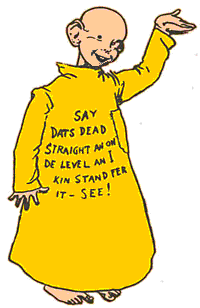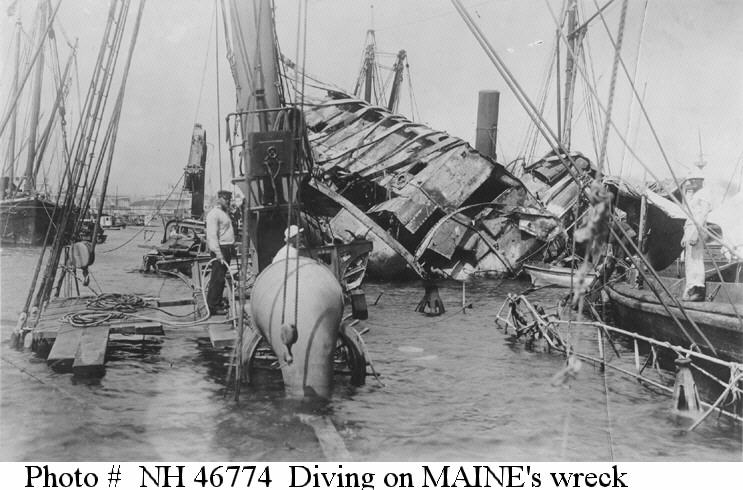
Mickey Dugan was born on February 17, 1895, on the wrong side of the tracks. A wise-cracking street urchin with a “sunny disposition”, Mickey was the kind of street kid you’d find in New York’s turn-of-the-century slums, maybe hawking newspapers. “Extra, Extra, read all about it!”
With his head shaved as if recently ridden of lice, Mickey was one of thousands of homeless street urchins roaming the back lots and tenements of the city, not as much an individual as an archetype. Mickey Dugan was a cartoon character, the child of artist and “Buster Brown” creator, Richard Outcault.

Outcault’s “Hogan’s Alley” strip, one of the first regular Sunday newspaper cartoons in the country, became colorized in May of 1895. For the first time, Mickey Dugan’s oversized, hand-me-down nightshirt was depicted in yellow. Soon, the character was simply known as “the Yellow kid”.
Outcault worked for Joseph Pulitzer in those days, owner of the New York World Newspaper. Archrival William Randolph Hearst hired the cartoonist away to work for Pulitzer’s cross-town competitor Journal American, but the pair soon received a lesson, in the law. There was no copyright protection on the Yellow kid. Before long, the character was simultaneously appearing in competing newspaper strips where he would remain, for over a year.

We hear a lot today about “fake news” but the sorry state of journalism, is hardly new. Circulation wars were white hot at the turn of the last century. Competing newspapers used anything possible to get an edge. Real-life street urchins hawked lurid headlines, heavy on scandal-mongering and light on verifiable fact. Whatever it took, to increase circulation.
The Yellow Kid character was gone by 1898 but he lived on in a way, in the style of newspaper reporting which came to be called “yellow journalism”.
After two wars for independence from Spain, the Caribbean island of Cuba found its economy increasingly intertwined with that of the United States. From the Spanish perspective, Cuba was more of a province than a colony. They were not about to relinquish a foot of territory. When the Cuban Rebellion of 1895 broke out, Spanish colonial administrator don Valeriano Weyler’s brutal repressions killed thousands in Cuban concentration camps.
In America, some saw parallels between the “Cuba Libre” movement, and the United States’ own revolution of a hundred-odd years earlier. Fearing the economic repercussions of a drawn out conflict, shipping and other business interests put pressure on President McKinley to intervene. Meanwhile, the yellow papers kept the issue front page, whipping up popular fury with tales of the noble Cuban revolutionary and the barbaric Spaniard. There were even tales of American women publicly strip searched, by Spanish authorities.

The armored cruiser USS Maine left Key West headed for Cuba in January 1898, to protect US interests and to emphasize the need for a quick resolution to the conflict. Anchored in Havana Harbor on February 15, a massive explosion of unknown origin rocked the Maine, sinking the cruiser within minutes and killing 268 of the 355 Americans on board.
The McKinley administration urged calm. Conditions in Cuba were bad enough, without front page headlines like “Spanish Murderers” and “Remember the Maine”, accompanied by sensationalized accounts of Spanish brutality. War became all but inevitable when US Navy findings were released that March, stating that the sinking had resulted from an external explosion.

The Spanish-American War began the following month, leading to the Philippine-American war.
There is a story that illustrator Frederic Remington said there was no war brewing in Cuba. Hearst is supposed to have replied. “You furnish the pictures and I’ll furnish the war.” The story may be apocryphal. Newspapers then couldn’t tell us what to think any more than today, but the media most certainly controlled what the public was thinking ABOUT.
For two years, Hearst and Pulitzer had clamored for war with Spain. Both were happy to take credit, when war came. Beside that, the war was good for circulation. A week after the Spanish-American War began that April, Hearst’s American Journal ran the headline “How do you like the Journal’s war?” Front page. Above the fold.
It’s been said you should never pick a fight with a guy who buys ink by the barrel. I disagree. I have broken that dictum myself and recommend the practice to anyone so inclined. For all the Wizard of Oz antics of the print and electronic media, there remains only the one man behind the curtain. Ask Jeffrey Zucker how that turns out.
President Reagan once said of the Soviet Union, “doveryai no proveryai” (trust, but verify). He might have said the same of an information industry whose business model it is, to rent an audience to a sponsor.

In 1976, a team of American naval investigators concluded that the explosion aboard the USS Maine was likely caused by a fire which ignited ammunition stockpiles and not by Spanish mine or act of sabotage.
What to say to the families of the 20,603 dead, wounded and missing from the Spanish-American war? The media of the day were and remain to this day, a tower of indifference.





Things really don’t change….
LikeLiked by 1 person
It doesn’t matter which side of the political divide we plebes find ourselves on. We need and we need to REQUIRE accurate information from these people.
LikeLiked by 1 person
I agee…it’s to the point where I would listen to outside news more than here.
LikeLiked by 1 person